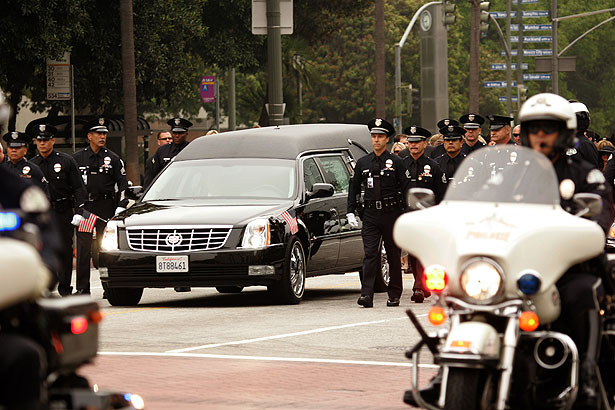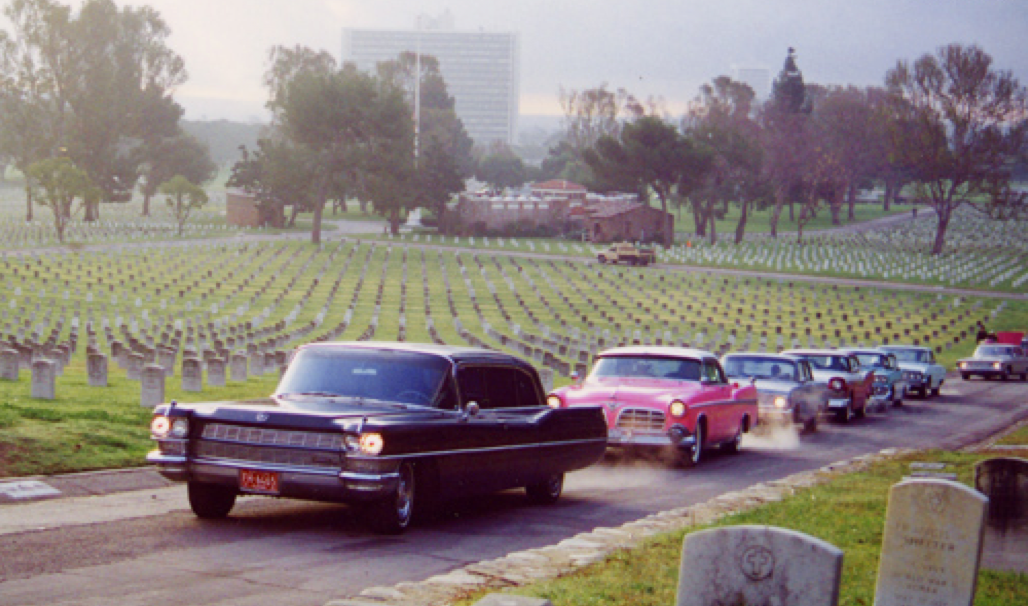
There are a few components of American funeral rituals that reliably agitate funeral directors and the public alike. Funeral processions—those lines of cars following the hearse and rolling through red lights—are one of the biggest. If you question whether these automotive convoys are appropriate, necessary, or safe, you can be sure that your character, lineage, and civic virtue will be insulted.
Bill Mayeroff is a blogger at ChicagoNow.com who wrote a post questioning the practice of funeral processions. It was picked up by the funeral-industry news aggregator site, ConnectingDirectors.com. All comments [sic].
“Let me guess, Bill Mayeroff is: 1. A baby boomer 2. A narcissist 3. An idiot.”
“I think this blogger should have this discussion face to face with the thousands of people who mourned and processed with any number of our fallen soldiers.”
“Although the article is so sophmoric that it doesnt earn the time of a reply, I feel I have to. It is all about respect of the dead. Something that the author probably knows very little about. He is an NPR listening, liberal, candy ass moron.”
“In today’s society, death rituals, etc. are often viewed as “inconvenient” to those involved. But, death should NOT be convenient – if it is, that person’s life didn’t mean much.”
So, commenters have established that Bill Mayeroff is a narcissistic, soldier-hating, un-patriotic baby boomer with a candy ass he keeps glued to National Public Radio in between ruining everyone’s Grief Work(TM). Except no, they haven’t. I too question the place of funeral processions. Many undertakers would say that’s because I’m an anti-funeral director outside agitator who hates sentiment and religion and wants to force families to bake-and-shake their loved ones. Or something.
The question isn’t whether funeral processions have value. The question is whether the value families find in them ought to outweigh their practical effect on public roadways and safety. That is a reasonable question to ask, and reasonable people ought to be able to discuss it.
Funeral directors are sharply defensive when the necessity of their business practices is questioned. This often leads to projecting cynical and misanthropic motives onto their conversational partners. Everyday, non-funeral-industry folks get their noses out of joint too. Readers wax indignant over the Downfall of Civilized Society wrought by selfish baby boomers/gen Xers/millenials/kids/liberals/narcissists/heartless conservatives.
Too many people confuse what grieving families need with what the general public is obliged to do. When someone close to us dies, it’s often the worst day of our lives. Sometimes the very most important person in our world is gone. I’ve been there. If I could have made the whole world stop when my close friend died young from cancer, I probably would have. But we also know that as dear to us as that dead friend is, the wider world doesn’t feel the same way we do.

This isn’t cruelty or heartlessness. It’s the normal state of human affairs. Private loss does not compel public participation.
When someone says, “But, death should NOT be convenient – if it is, that person’s life didn’t mean much,” they’re making a leap. I know what the commenter means: That we too often neglect death and try to sanitize it away, perhaps losing some very meaningful family time.
But that has precisely nothing to do with what strangers think and do. Even if you believe death “shouldn’t be convenient” for mourners—which is rather presumptuous—you need to explain why you believe the general public is obliged to shoulder that burden too. We’re not talking about public funerals. We’re not talking about national grief after an assassination, or the public solemnities we confer on dead soldiers. No one is saying that public mourning of important figures should be outlawed or scoffed at.
That’s why the question of funeral processions rankles some people so much. Common courtesy and decency require us to pull over for a funeral procession. I pull over for them because my mom raised me right, just like yours did. They do not require us to refrain from questioning the overall practice of funeral processions and proposing change.
 So, are funeral processions truly dangerous or inconvenient enough to justify outlawing them? I don’t know because I don’t have objective data on the traffic hazards. But I do know it’s within the bounds of civil discourse to ask.
So, are funeral processions truly dangerous or inconvenient enough to justify outlawing them? I don’t know because I don’t have objective data on the traffic hazards. But I do know it’s within the bounds of civil discourse to ask.
On my way to work this week I got stuck behind a procession. It was almost ¾ of a mile long, traveling down a two-lane road already littered with blind curves, speed bumps, and frequent semi-truck traffic. It’s a frustrating and potentially dangerous road on the best of days.
As the procession approached a four-way traffic light it was obvious that neither the mourners nor the other motorists had any idea what to do. Cars crept hesitantly, unsure of whether the motorcade would run the red light. It did, and very nearly drummed up some more business for the cemetery. It should be plain why some of us raise the question of whether this is the best public policy.
The problem is not rude, hateful, selfish people who “don’t respect the dead the way they used to.” The problem is that we don’t travel by horse and buggy, yet any time someone questions funeral processions we act like we live in Walnut Grove, Minnesota, circa 1876. Do we really believe that any death, regardless of time or circumstance, should be able to commandeer public roadways? Do we really believe that the needs of all motorists to get their kids to school, to board the city bus, and to do so safely with predictable road behavior should just naturally be ignored because our most important person in the world died?
No one is trying to deny families rituals for grieving. Surprisingly few people actually hate America, soldiers, and funeral directors. We are asking a relevant and appropriate question: Is there a better way to balance private grief with public administration and safety?
Joshua Slocum joined the Funeral Consumers Alliance staff in 2002 and became executive director in 2003. He has appeared as an expert commentator on funeral issues in national media such as 60 Minutes, the New York Times, CNN, AARP Magazine, and CBS News. In 2009, he testified before a Congressional committee on the need to bring cemeteries, crematories, and all death industry vendors under the Federal Trade Commission’s Funeral Rule, the only national protections funeral consumers enjoy.
